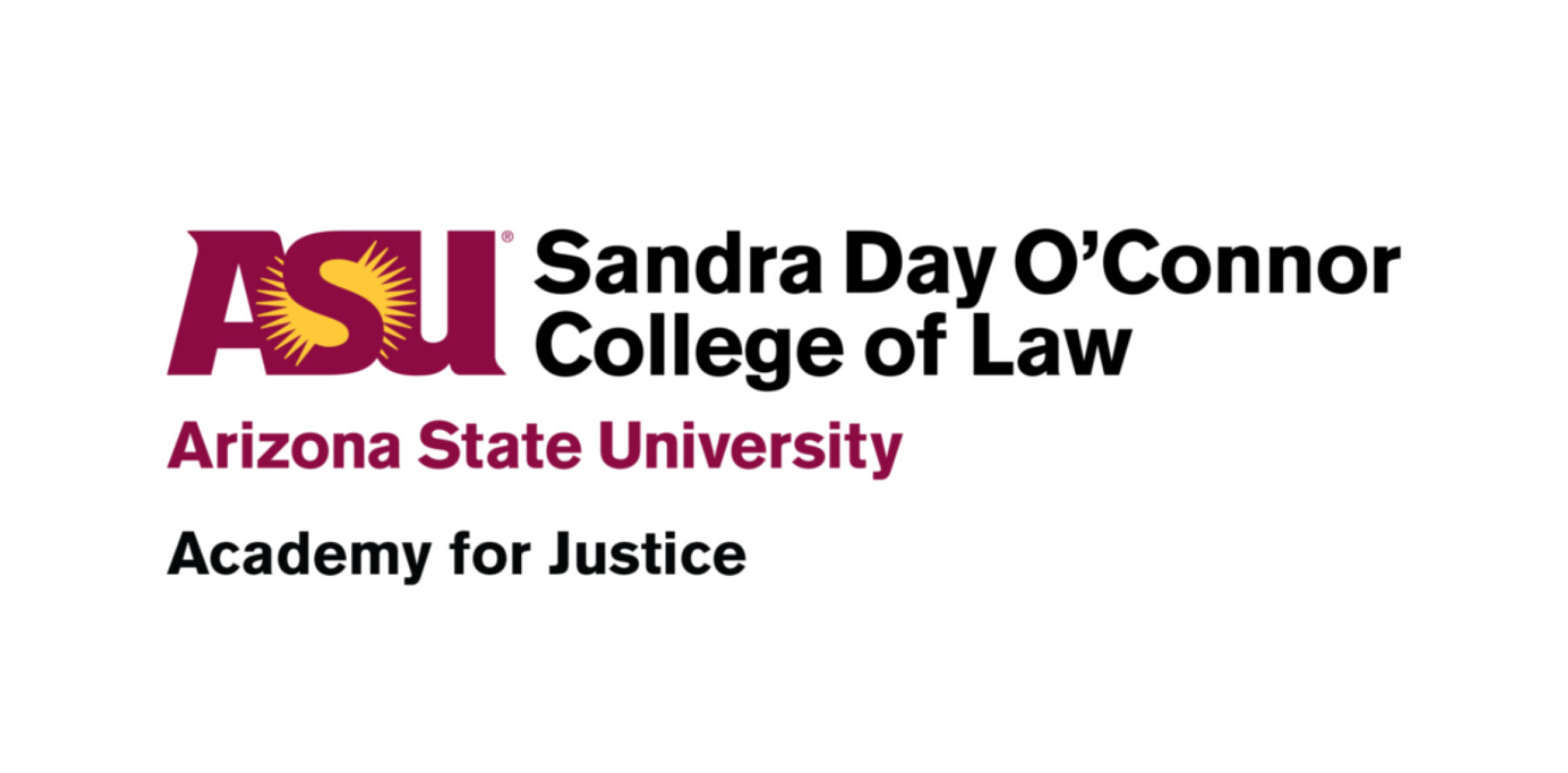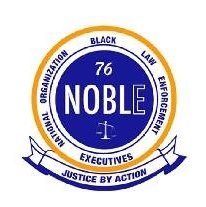
Policing and Drug Policy: A Working Roundtable Discussion
Arizona State University, Phoenix, AZ
Thursday, March 30, 2023
The Academy for Justice at the Sandra Day O’Connor College of Law at Arizona State University—in collaboration with the National Organization of Black Law Enforcement Executives (NOBLE)—hosted a roundtable discussion and dinner at the College of Law to facilitate the exchange of ideas and innovations in the overlapping fields of policing, drug policy, and harm reduction. A panel of experts examined critical issues within these fields, including alternatives to incarceration and criminal justice system involvement for substance use-related crimes and non-violent substance use-driven crimes (trespass, shoplifting, minor theft). These experts explored and discussed ways in which police can act as agents of harm reduction in the public health crisis of opioid addiction.
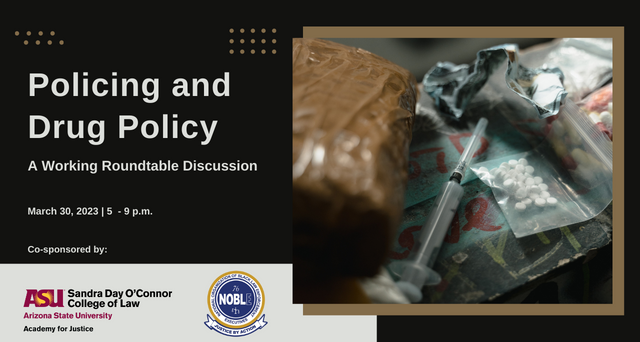
Sponsors
The Academy for Justice was established at the Sandra Day O’Connor College of Law at Arizona State University in July 2018. Its mission is to bridge the gap between academia and on-the-ground criminal justice reform by making scholarly research and ideas accessible to policymakers, stakeholders, journalists, and the public. As a scholarly collective, our approach to criminal justice reform is interdisciplinary, pragmatic, and non-partisan.
The National Organization of Black Law Enforcement Executives (NOBLE) serves as the conscience of law enforcement by being committed to justice by action. Founded in September 1976 during a three-day symposium to address crime in low-income urban areas, NOBLE is currently comprised of 59 chapters in six regions throughout the United States with members in Canada, the Caribbean, the United Kingdom, and several countries in Africa. Whether members are engaged in a food or clothing drive, presenting the Law and Your Community, reading to children, awarding scholarships, or talking with young people about safety—be it traffic safety, gun safety, internet safety, bullying or HIV/AIDS prevention—NOBLE cares!
Event speakers
Opening remarks
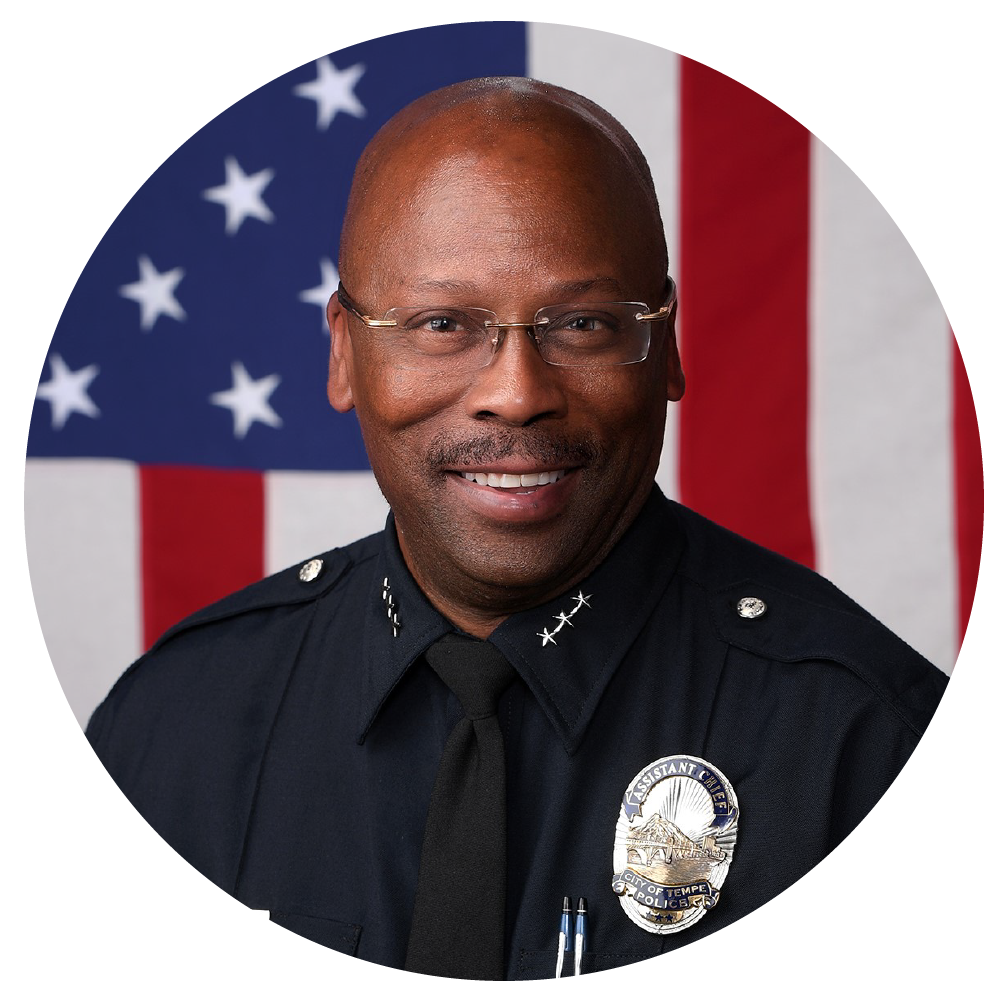
Andre C. Anderson
Executive Assistant Police Chief, Tempe Arizona Police Department
Andre C. Anderson is an Executive Assistant Police Chief with the Tempe Arizona Police Department. As a police leader, Andre has served in law enforcement for more than 35 years, combining two years of service from the Arizona Department of Corrections. Andre has served in a leadership role for over 22 years and has been fortunate to serve over every leadership command of a modern-day police department. He has served in every rank, from an officer to detective to Executive Deputy Chief, Executive Assistant Chief and Interim Police Chief. He holds a Masters Degree from Northern Arizona in Education and Leadership. His career includes, but is not limited to, leading the Glendale Police Department Criminal Investigations Division’s Homicide and all investigative Units, the Special Events Division responsible for national and local events, include working with the NFL Arizona Cardinals leadership, Phoenix Coyotes, the NCAA Final Four, major soccer events, and nationally recognized entertainer, SWAT, Traffic, Bombs, and Emergency Management. He has led community policing and community engagement squads and has taught and traveled abroad, helping organizations learn the concepts of community policing.
Andre C. Anderson served as the Special Assistant to the National President of the National Organization of Black Law Enforcement Executives (NOBLE). He was also the NOBLE Region VI President and local Arizona President. With NOBLE, he was tasked with developing a response to engage national community dialogue and working with others to usher in methods designed to build trust and legitimacy from lessons learned from his stent as the Interim Police Chief in Ferguson MO, working the DOJ and incorporating the President’s Task Force on 21st Century Policing. Under President Obama’s administration, the United States President’s office called upon him and the NOBLE President to travel to Charlotte NC to serve with others to ease tension stemming from protest.
Andre is most known for serving as Executive Deputy Police Chief of Rochester, New York, and the Interim Police Chief in Ferguson, Missouri, both police departments facing several national concerns after the wake of the Daniel Prude death and the Mike Brown JR shooting coined as the new ground zero and civil rights destination of the nation. During his tenure at both locations, he led successful conclusions to civil unrest, which eased tension, created better relationships in the community, introduced and led modern-day evidence-based community policing, and was the initial lead policing expert to negotiate with the Department of Justice Consent Decree levied as a “Pattern or Practice of Discriminatory Policing.” For his role in Ferguson, he was inducted into the National Law Enforcement Museum, Washington DC
Assistant Chief Anderson strongly believes that “identifying dedicated police professionals who exemplify the organization’s image while remaining committed to community policing and the organization’s values are the keys to success.”
Moderator
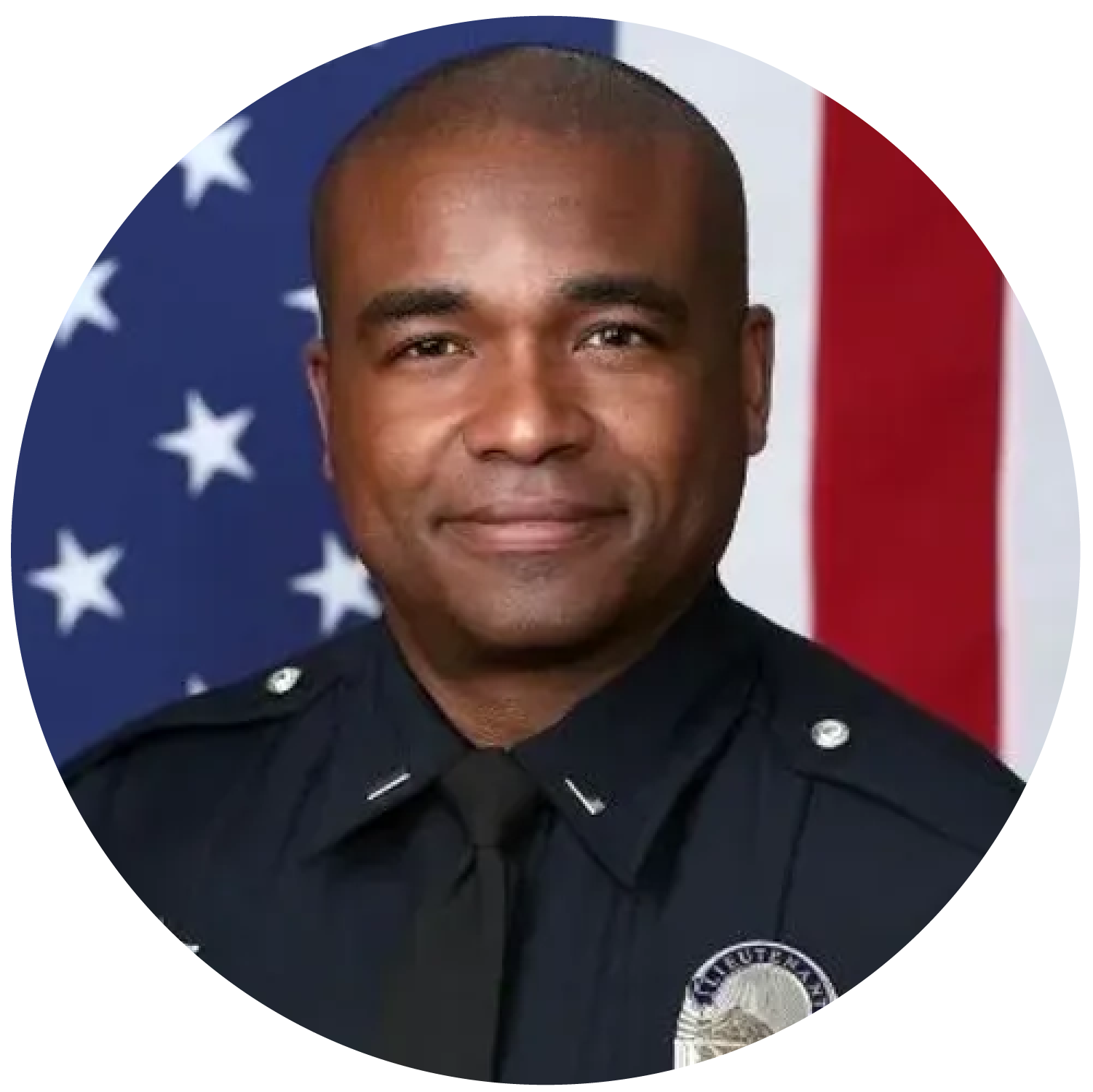
Rashidi Johnson
Commander, Tempe Police Department
Cmdr. Johnson has been with the Tempe Police Department for 20 years and has served with humility in many capacities. Cmdr. Johnson served as a patrol officer, where he responded to high-risk calls for service, investigated crimes of violence, property crimes, narcotics, and interacted with the community regarding concerns and outreach. Cmdr. Johnson served in the downtown district as a bike officer, where he investigated aggravated assaults, disorderly conduct, and crimes related to alcohol. Cmdr. Johnson also served in the Special Investigation Bureau as an undercover detective. He conducted narcotics investigations, VICE investigations, human trafficking, and large-scale drug trafficking investigations that included Maricopa County T-3 wiretaps. Cmdr. Johnson also served ten years on the SWAT team, where he responded to barricades, search warrants, and fugitive apprehension operations.
Cmdr. Johnson was promoted to Sergeant in 2013, where he supervised teams with the objective that they provide quality service to the community. Cmdr. Johnson served in Internal Affairs as a Sergeant, where he was responsible for ensuring transparency and accountability within the Tempe Police Department. In 2020 Cmdr. Johnson was promoted to the rank of Lieutenant where he served as the watch commander in the Field Operations Division, ensuring the community received quality service by using the best practices approach to operational readiness. Cmdr. Johnson served in the training and hiring unit where he was responsible for hiring, recruitment, retention, and ensuring best police practices. Currently, Cmdr. Johnson serves in Central Bureau where he is responsible for downtown Tempe.
Cmdr. Johnson is married with two kids, has two dogs and is grounded by his faith in Christ. Cmdr. Johnson is the Arizona Chapter President of the National Organization of Black Law Enforcement Executive (NOBLE); he has a bachelor’s in Political Science and a Master’s in Organizational Leadership.
Expert panel

Leo Beletsky
Professor of Law and Health Sciences and Faculty Director, The Action Lab at the Center for Health Policy and Law
Professor Beletsky holds an interdisciplinary appointment with the School of Law and Bouvé College of Health Sciences. His expertise is on the public health impact of laws and their enforcement, with special focus on substance use and addiction, infectious disease, occupational safety of first responders, and policing as a structural determinant of health. Professor Beletsky is a frequent media commentator on harm reduction approaches to address North America’s overdose crisis, as well as other issues at the intersection of public health and public safety. Those intersections also define the project portfolio of The Action Lab at the Center for Health Policy and Law, which he founded and directs at the School of Law.
As one of a small group of legal academics consistently funded by the National Institutes of Health, Professor Beletsky has conducted numerous empirical studies in domestic and international settings to examine the role of policing and legal factors in shaping health outcomes. He served as the principal investigator (MPI, with Steffanie Strathdee) of the first-ever research project funded by NIH/NIDA to evaluate how a law enforcement training can improve public health. Using both quantitative and qualitative methods, Professor Beletsky’s current work continues to explore drug policies’ health effects and pathways by which racial disparities in the criminal legal system result in health disparities.
In line with Northeastern’s social impact ethos, Professor Beletsky actively works to translate research to policy, legal and the broader public audiences. He applies his skills and expertise in service to governmental agencies and non-governmental organizations. Most recently, this has included The Global Fund, The Pew Charitable Trusts and two Massachusetts state commissions. His research and service have received broad recognition at international, national and local levels, including recent awards from the International AIDS Society, the Association of American Law Schools and the First Church of Cambridge.

Dave Hanson
Detective, Naloxone Program Coordinator
Dave is a 23-year veteran of the Tempe Police Department. During his tenure, he worked as a Patrol Officer and a Detective assigned to Property Crimes, Arson, Metal Theft, and Special Victims Unit. He is also a SWAT Negotiator, Drone Operator, and involved in Peer Support. He is currently the Tempe Police Naloxone Program Coordinator and is responsible for supplying, and training patrol officers, non-sworn employees, detention staff, and special assignment officers with recognizing the signs and symptoms of Opioid Overdose and how to use Narcan to reverse overdoses. He also coordinates with EMPACT Navigators to provide outreach and resources to people who overdose and are saved by TFD or TPD Narcan. He is also involved in the data gathering for Dr. Michael D. White, Dina Perrone, Seth Watts, and Aili Malm for the ASU Study portion of the program.
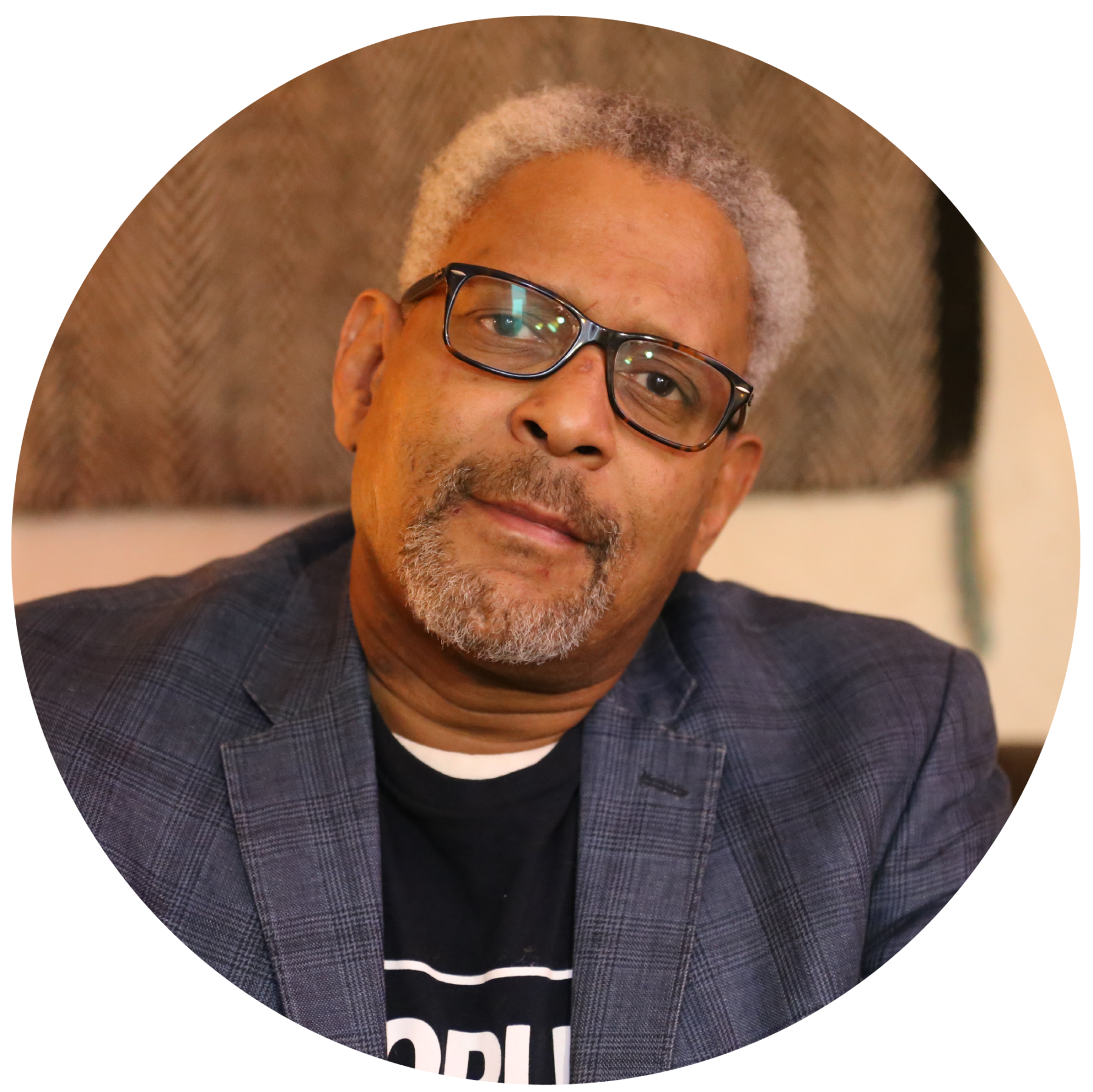
Barron Jones
Senior Policy Strategist, ACLU of New Mexico
Barron joined the ACLU of New Mexico in January 2018 to coordinate the affiliate’s Smart Justice Campaign. Since then he has been promoted to senior policy strategist where he spearheads the organization criminal legal system reform work. With the help of his ACLU colleagues and coalition partners, Barron has had the pleasure working on legislation that will help heal New Mexico families and communities harmed by the “War on Drugs” and other regressive policies that disproportionately impact BIPOC communities. The laws include efforts such as the Law Enforcement Diversion Program (LEAD), Criminal Records Expungement Act, Ban the Box, Body-Worn Camera and the New Mexico Civil Rights, to name a few.
Prior to his work at the ACLU, Barron spent several years working as a print and broadcast reporter covering stories related to government accountability and education. He also has extensive experience writing about issues of domestic violence, poverty, and addiction, especially as they relate to the pressing need for criminal justice reform and improved public safety.
He earned a degree in journalism from the University of New Mexico and has worked for several news outlets in Central and Northern New Mexico. Barron entered school as a nontraditional student and credits his education for helping him to address the issues that led him to be negatively impacted by the state’s criminal justice system.
He believes his work on justice reform will have a powerful impact on his community. Barron grew up in Detroit, but has lived in New Mexico for over 20 years. He is the proud papa of two rescue dogs, Holmes and MeToo.

Dr. Josephine Korchmaros
Director, University of Arizona’s Southwest Institute for Research on Women (SIROW)
Dr. Korchmaros is Director of the University of Arizona’s Southwest Institute for Research on Women (SIROW). Since earning her doctoral degree in Social Psychology with a focus on quantitative research methods in 2003, Dr. Korchmaros has developed, implemented, evaluated, and provided training and technical assistance for multiple grant-funded research projects of importance to underserved populations (e.g., racial/sexual minorities including women/girls and Native American populations). Her research has focused on treatment models; reduction of risk behaviors; addressing group-based (e.g., culture and gender identification) health disparities; and system and policy improvement in such areas as sexual health, substance use, and justice-involvement.
Dr. Korchmaros takes a research-to-practice focus, aiming to:
- disseminate research findings in a timely manner using multiple mediums and outlets;
- increase the extent to which practice is informed by research; and
- encourage policy change and funding programs informed by current research and knowledge.
She has produced peer-reviewed research briefs, trainings, papers, implementation tools, and presentations concerning accurate identification of service need within underrepresented, marginalized, and under-resourced populations, effectively addressing such need and encouraging health-related behavior change.
Dr. Korchmaros also has extensive experience conducting and assisting others to conduct culturally-informed intervention and research. She has developed theoretically-based and research-informed health-related behavior interventions for different populations. She has also informed the field about the particular influencing factors related to health-related behavior in particular populations. Finally, Dr. Korchmaros’ work has informed the field about the practice of implementing culturally-informed intervention and research.

Melissa Zabor
Commissioner, Maricopa County Superior Court
Melissa Zabor has served as a Commissioner for the Maricopa County Superior Court since 2017. She is currently assigned to the Criminal Department and oversees settlement conferences, changes of plea, jury trials, and sentencings. She currently presides over a women’s drug court and has previously handled drug and DUI courts. Before taking the bench, she worked as an attorney and a supervisor for the Maricopa County Office of the Legal Advocate in criminal public defense. She also taught business law at Chandler-Gilbert Community College for five years, worked in private practice, and worked as a prosecutor for the Maricopa County Attorney’s Office. Commissioner Zabor earned both her Juris Doctorate and a Bachelor of Science in Psychology from the University of Arizona.
Closing remarks

Shannon Johanni
Research Director for Academy for Justice, Sandra Day O’Connor College of Law, Arizona State University
Shannon Johanni joined the Academy for Justice as Research Director in July 2022. In this role, Shannon is helping shape A4Js newest initiative examining violent crime.
Shannon has worked for nearly 25 years in the criminal justice arena, with 11 years of practice experience in the appellate and criminal justice fields. As a prosecutor, she initiated office wide policy, procedure, and technology development, established reciprocal relationships with law enforcement to address systemic and case specific issues, and trained new attorneys on trial practice, evidence, criminal procedure, and best practices for domestic violence prosecution; all while carrying a large caseload of high-profile and high-risk domestic violence cases.
Before serving as a prosecutor, Shannon clerked for the Honorable Peter B. Swann of the Arizona Court of Appeals, drafting appellate decisions and legal memorandum. During law school, Shannon served as a Criminal Justice Teaching Fellow facilitating peer courts in the Syracuse, NY, inner-city schools, acted as Managing Editor of the Syracuse Law Review, and worked as the graduate assistant for the Institute for the Study of the Judiciary, Politics, and the Media. Prior to law school, she supervised misdemeanor victim services for the Boulder County Colorado District Attorney’s Office and worked as a legal advocate in a domestic violence shelter, providing direct services to victims through a protection order clinic and by coordinating a pro-bono family law clinic.
Shannon graduated from the University of Colorado at Boulder, earned a Master of Public Administration from the University of Colorado at Denver, and received a J.D. from Syracuse University College of Law, graduating summa cum laude.
Resources
Statutes
ARS 36-2228
Administration of opioid antagonists; training; immunity; designation by director
ARS 36-2266
Prescribing and dispensing; immunity
ARS 36-2267
Administration of opioid antagonist; exemption from civil liability
Relevant case law
United States v. Booker 543 U.S. 220
United States v. Kimbrough 552 U.S. 85
Secondary sources
Applying harm reduction principles to policing of retail drug markets
Alex Stevens, March 2013
Beyond Decriminalization_ Ending the War on Drugs Requires Recasting Police Discretion through the Lens of a Public Health Ethic
Brandon del Pozo, Leo Beletsky, Jeremiah Goulka, and John Kleinig; 2021
Deflection: Powerful Crime-Fighting Tool That Improves Community Relations – Police Chief Magazine
Jac Charlier
Essential Principles for Successful LEAD Implementation
National Support Bureau
How Structural Violence Prohibition and Stigma Have Paralyzed American Responses to Opioid Overdose
Mark Tyndall, August 2020
Alternatives to Arrest
IACP, September 2022
Model Law Enforcement and Other First Responder Deflection Act
Legislative Analysis and Public Policy Associate, September 2021
Moving Beyond Narcan: A Police, Social Science, and Researcher Collaborative Response on Opioid Crisis
Michael D. White, Dina Perrone, Seth Watts, and Aili Malm; December 2020
Narcan cops: Officer perceptions of opioid use and willingness to carry naloxone
Michael D. White, Dina Perrone, Aili Malm, and Seth Watts
Pathways to Diversion Case Studies Series
Law Enforcement and First Responder Diversion, BJA, COSSAP
Police discretion in encounters with people who use drugs: operationalizing the theory of planned behavior
Brandon del Pozo, Emily Sightes, Jeremiah Goulka, Brad Ray, Claire A. Wood, Saad Siddiqui, and Leo A Beletsky
Roadmap for Anti-Racism: First Unwind the War on Drugs Now
Andre Douglas Pond Cummings and Steven Ramirez; February 2022
SAFEProject: Pre-Arrest Diversion Resource Guide
Alice Zhang, Joseph A. Balles, Jennifer E. Nyland, Thao H. Nguyen, Veronica M. White, and Aleksandra E. Zgierska
The Uses and Abuses of Police Discretion: Toward Harm Reduction Policing
Katherine Beckett
The Stigmatization of Justice involved Individuals with Substance Use Disorders
Perspectives from Criminal Justice Practitioners and those with Lived Experience
Hannah Laqueur, Stephen Rushin, and Jonathan Simon
The University of Arizona, Southwest Institute for Reach on Women.
Feasibility and Acceptability of a Police Pre-arrest Deflection Program
The University of Arizona, Southwest Institute for Reach on Women.
Impact of SHIELD Police Training onKnowledge of Syringe Possession Laws and Related Arrests in Tijuana, Mexico
Pieter Baker, Leo Beletsky, Richard Garfein, Eileen Pitpitan, Eyal Oren, Steffanie A. Strathdee, and Javier A. Cepeda
Problem statement
Click below to read the problem statement for the roundtable which will help guide the discussion surrounding the policy on drugs.
